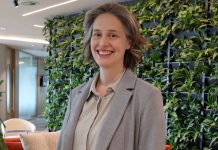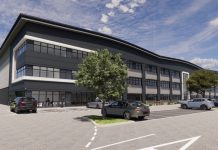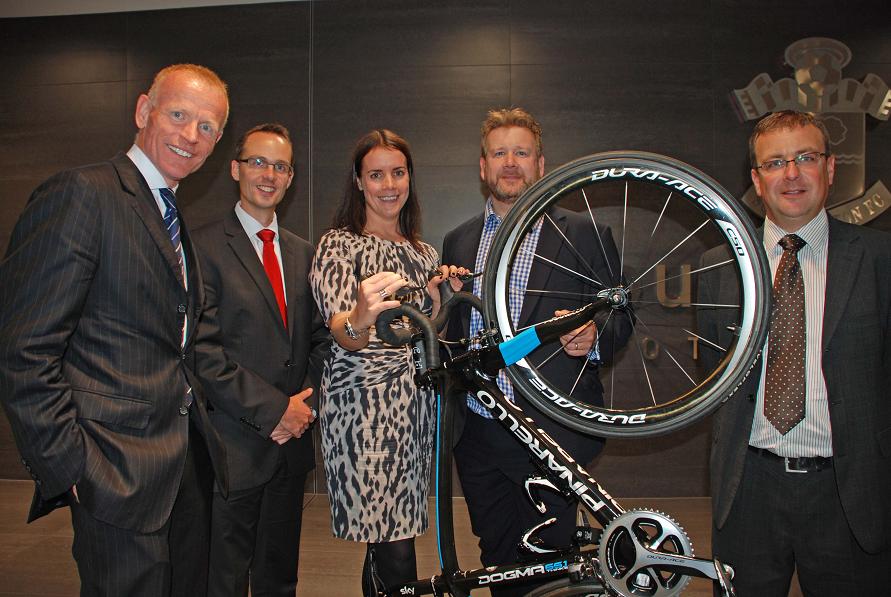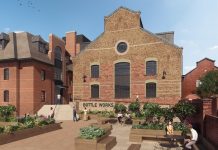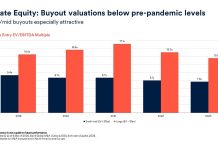A leading light heavily included in the transformation of British professional cycling has described to business leaders in the Solent region how success is driven by commitment to excellence at all levels.
Fran Millar, one of Team Sky’s founding members and currently Head of Winning Behaviours, addressed more than 50 business leaders at the first-ever Solent Business Growth Summit, held at St Mary’s Stadium in Southampton.
The keynote speaker shared how Team Sky’s guiding CORE principles made two British Tour de France champions in Sir Bradley Wiggins and Chris Froome.
CORE stands for commitment, ownership, responsibility and excellence.
Team Sky focuses on the outcome – victory – and works back from there with a targets programme to make the dream happen for its “podium people” through winning behaviours.
From athlete to mechanic, each member of the team knows from the start they have to give everything on the difficult journey to gold, that we “have to be the best every day”, that we “own each other’s reputations” at all times.
Fran added: “It is important you communicate your strategy loud and clear to everyone – there is no point having a plan if nobody knows about it.”
The three-hour event was hosted by businesses with a strong presence in the Solent region – commercial property consultancy Hughes Ellard, Santander Corporate & Commercial, accountancy and investment management group Smith & Williamson and law firm Trethowans.
Delegates were given an detailed audio-visual update on regional trends and issues by a range of speakers from the hosts, including what is being done to promote business in the region.
Simon Rhodes, who is chairman of Future Southampton and the managing partner of Trethowans, said afterwards: “The feedback we received from the audience was exceptionally positive, with Fran’s speech inspiring and thought-provoking.
“Indeed, it is in our collective interests, from start-ups to corporates, to create the Team Solent business equivalent of Team Sky.”
He added: “We will be considering whether to make the growth summit an annual fixture in the business calendar.”
At the event, Barry Naisbitt, Santander’s chief economist, looked in detail at the UK economy.
He said recovery is more firmly based, with increased business confidence and investment intentions.
Steady growth in the UK is expected to continue in 2015 and the Solent economy is performing well against the national background, based on a range of indices such as business confidence and employment rates. The UK is also expected to perform strongly in the global context.
Mr Rhodes, wearing his cap as chairman of Future Southampton Board, called for increased collaboration between the private and public sectors and urged that Portsmouth and Southampton sell the Solent region rather than their own cities as “no one city or town has it all”.
Citing the commercial competition posed by cities such as Bristol, Manchester and Liverpool (through its port), Mr Rhodes said: “We could be fighting every other region, instead of fighting internally, and we could agree to sell the Solent region, with one joint brand and salespeople to sell it.”
Inroads have already been taken on this front, with the city councils in Portsmouth and Southampton coming together under the Solent brand to sell the region at this year’s MIPIM, the world’s leading real estate conference involving businesses from 93 countries.
Other collaboration is also taking place, Mr Rhodes told delegates. They include organisations such as Business South, Hampshire Chamber of Commerce, Future Southampton, Shaping Portsmouth, Hampshire Ambassadors, Solent Local Enterprise Partnership (LEP) and Future Solent.
Echoing the later talk by Team Sky’s Fran, he summarised: “Teamwork works.”
Gary Jeffries, chairman of Solent Local Enterprise Partnership and managing director at commercial property consultancy Hughes Ellard, detailed the £2.4 billion strategic economic plan for the Solent.
The proposals to 2020 will enable flagships for housing and employment, enhance transport connectivity, grow our skills base and support business growth.
Objectives include:
· Creating an extra 15,500 jobs
· Unlocking 500,000 sq m of new employment floor space, with a focus on supporting growth in the marine, maritime and advanced manufacturing sectors
· Delivering an additional 24,000 new homes
· Supporting the creation of 1,000 small and medium enterprises
· Leveraging in £1 billion-plus of private sector investment
· Upgrading 51,000 sq m of further education college space
· Raising the number of residents with Level 4+ qualification by 4% (37,000 people).
Mr Jeffries said: “This is about investing in skills to establish a sustainable pattern of growth, establishing a single inward investment model and enabling infrastructure priorities and connectivity.
“One of the focuses will be on developing strategic sectors and clusters of marine, aerospace and defence, advanced manufacturing, engineering, transport, logistics, low carbon and the visitor economy.”
Geraldine Buckland, head of people management at Smith & Williamson, told delegates there was “an underperformance” in higher level skills locally; more than half of all job opportunities to 2020 will require higher level skills.
Growth sectors will increasingly require the STEM skills of science, technology, engineering and mathematics, she explained.
Ms Buckland suggested employers should plan now how to fill their future skills gaps, such as through apprenticeships, relationships with education, internal succession planning and retention of best talent.
She warned that digital natives – youngsters who socialise and live life via social media – may be short of social skills in the workplace, that they can find interaction with colleagues exhausting.
“I was told by one of them: ‘I don’t know when I last said so many words or looked at someone for so long’.”
The event was held as new data from the Office of National Statistics, following revisions dating back to 1997 to comply with European standards, showed that the UK economy is soaring.
Following the deepest recession since the Second World War, when the economy shrank by 6% in 2008 and 2009, the economy as measured in Q2 2014 is 2.7% higher than the pre-economic downturn peak of Q1 2008.
Alex Fuller, regional director at Santander Corporate & Commercial, said after the event: “It was clear from today’s Solent Business Growth Summit that the region has emerged from the downturn in relatively good shape and is well positioned to take advantage of the widely reported upturn in economic activity.
“It makes strong sense, as the region grows, that we all ride together under the Team Solent banner, combining the best of each organisation to make the Solent region the place to do business on the South Coast.”


